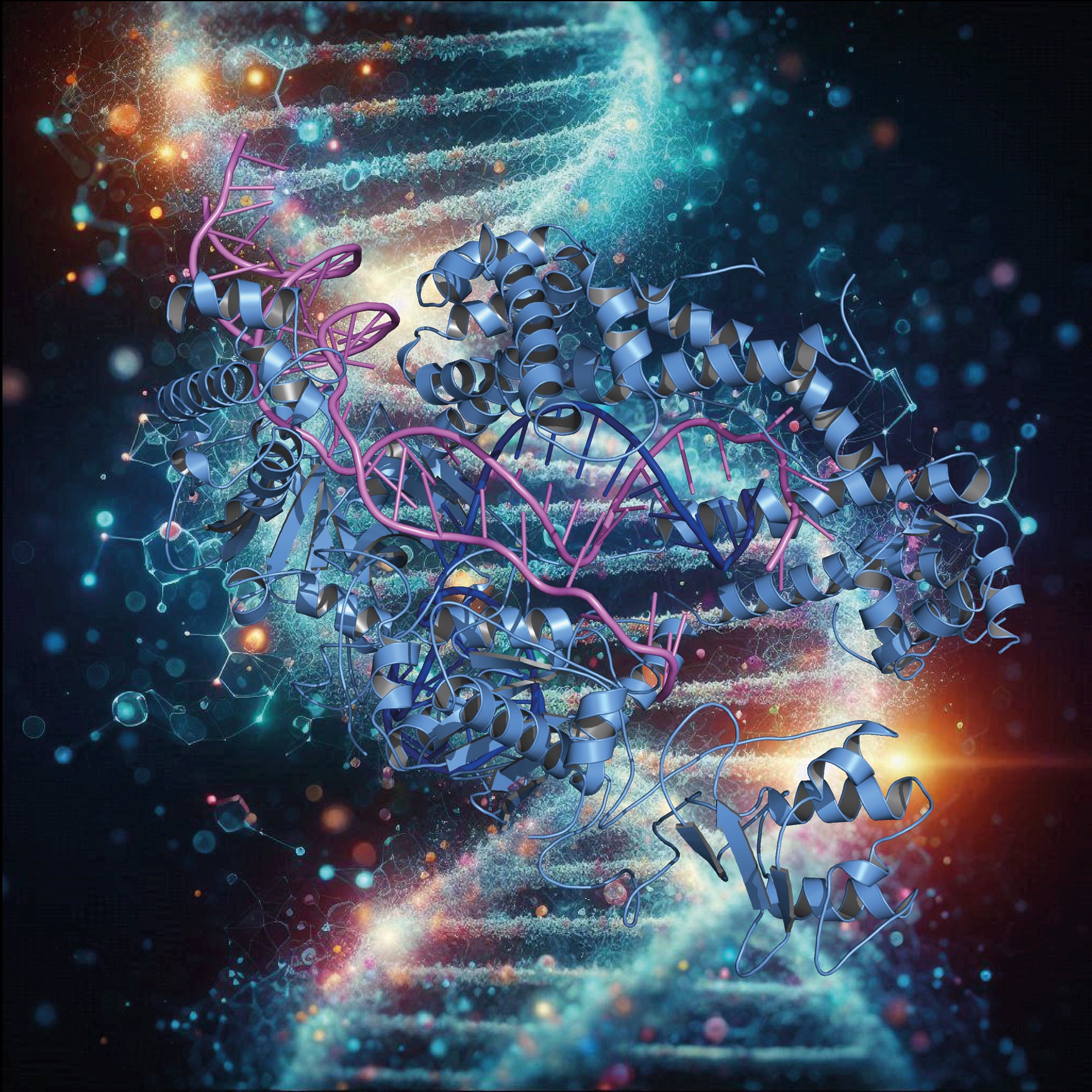
2024/10/31
CIC bioGUNE leads the development of ReChb, the most advanced and versatile gene editing tool to date
Scientists from CIC bioGUNE have created ReChb, a CRISPR tool that allows for more flexible and precise nucleic acid editing, thanks to ancestral sequence reconstruction (ASR).
This breakthrough, recently published in Nature Biotechnology, has the potential to revolutionize nucleic acid editing, enhancing applications in biomedicine, gene therapy, and molecular diagnostics.
An international team of scientists, led by the Cooperative Research Center in Biosciences (CIC bioGUNE), member of BRTA, in collaboration with Biofisika Institute of the University of the Basque Country and Helmholtz Institute for RNA-based Infection Research (HIRI) in Germany, has achieved a significant milestone in genetic editing and biotechnology.
Under the direction of Raúl Pérez-Jiménez, Ikerbasque Research Professor and group leader of the Synthetic Biology laboratory at CIC bioGUNE, a new CRISPR tool called ReChb has been developed. This tool expands the capabilities of existing Cas12a nucleases, offering greater versatility and precision in nucleic acid editing and detection. This advancement is attributed to the technique of ancestral sequence reconstruction (ASR), which allows the redesign of proteins from millions of years ago.
ReChb differs from natural or modified variants of Cas12a in that it is not limited by specific PAM DNA sequences, enabling it to edit regions of the genome that were previously inaccessible. Additionally, it has the unique ability to recognize and process both DNA and RNA, thereby broadening its range of applications. This tool is designed to perform precise genetic edits in human cells, and its capacity to efficiently cut double-stranded DNA, single-stranded DNA, and RNA without the need for specific sequences makes it the most versatile tool of its kind to date.
ReChb not only overcomes the limitations of traditional CRISPR tools but also enables applications across various fields, from biomedical research and gene therapy to precise molecular diagnostics. Its ability to be activated with different types of nucleic acids positions it as an essential tool for addressing genetic and viral diseases, eliminating previous restrictions of similar technologies.
“The new ReChb nuclease has molecular properties that have not been achieved with any other enzyme design technique, making it a perfect tool for multiple applications in medicine and biotechnology”, affirmed Raul Pérez-Jiménez.
In ALS (Amyotrophic Lateral Sclerosis) research, ReChb is already being used to facilitate advances in the diagnosis and treatment of this neurodegenerative disease. Its flexibility and precision in recognizing and editing nucleic acids open up new possibilities for investigating ALS and other complex pathologies, as it can potentially correct any genetic modification, even those inaccessible to conventional CRISPR techniques, contributing to the development of new therapies against these currently incurable diseases.
“The unique versatility of ReChb expands the application space of CRISPR-Cas nucleases, enabling the editing of ALS mutations that are inaccessible to current genome editing systems”, explains Ylenia Jabalera.
This advancement has been made possible thanks to the support of national and international institutions, including the European Union, the Spanish Ministry of Science and Innovation, the Basque Government, and foundations such as FUNDELA. The cryo-electron microscopy capabilities of CIC bioGUNE and the Biofisika Institute also played a crucial role in the study of ReChb.
ReChb not only represents a breakthrough in gene editing but also highlights the potential of ancestral sequence reconstruction (ASR) for developing biotechnological tools with unique properties. Thanks to this technique, a protein has been obtained with functionalities superior to any modern Cas12a, significantly expanding opportunities in biotechnology and precision medicine.
Reference: Ylenia Jabalera, Igor Tascón, Sara Samperio, Jorge P. López-Alonso, Monika Gonzalez-Lopez, Ana M. Aransay, Guillermo Abascal-Palacios, Chase L. Beisel, Iban Ubarretxena-Belandia & Raul Perez-Jimenez. A resurrected ancestor of Cas12a expands target access and substrate recognition for nucleic-acid editing and detection. Nat. Biotechnol. DOI: 10.1038/s41587-024-02461-3.
About CIC bioGUNE
The Centre for Cooperative Research in Biosciences (CIC bioGUNE), member of the Basque Research & Technology Alliance (BRTA), located in the Bizkaia Technology Park, is a biomedical research organisation conducting cutting-edge research at the interface between structural, molecular and cell biology, with a particular focus on generating knowledge on the molecular bases of disease, for use in the development of new diagnostic methods and advanced therapies.
About Ikerbasque
Ikerbasque - Basque Foundation for Science - is the result of an initiative of the Department of Education of the Basque Government that aims to reinforce the commitment to scientific research by attracting, recovering and consolidating excellent researchers from all over the world. Currently, it is a consolidated organization that has 290 researchers/s, who develop their work in all fields of knowledge.
About BRTA
BRTA is an alliance of 4 collaborative research centres (CIC bioGUNE, CIC nanoGUNE, CIC biomaGUNE y CIC energiGUNE) and 13 technology centres (Azterlan, Azti, Ceit, Cidetec, Gaiker, Ideko, Ikerlan, Leartiker, Lortek, Neiker, Tecnalia, Tekniker y Vicomtech) with the main objective of developing advanced technological solutions for the Basque corporate fabric.
With the support of the Basque Government, the SPRI Group and the Provincial Councils of the three territories, the alliance seeks to promote collaboration between the research centres, strengthen the conditions to generate and transfer knowledge to companies, contributing to their competitiveness and outspreading the Basque scientific-technological capacity abroad.
BRTA has a workforce of 3,500 professionals, executes 22% of the Basque Country's R&D investment, registers an annual turnover of more than 300 million euros and generates 100 European and international patents per year.
See a large version of the first picture





